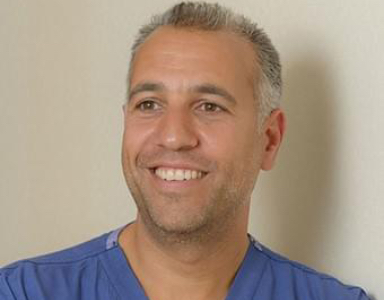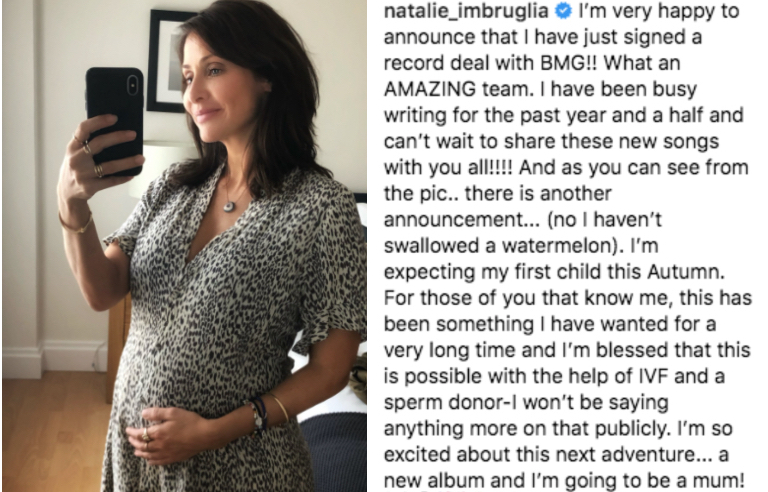Singer Natalie Imbruglia is having a baby using a sperm donor – if you’re thinking of it, we talked to a leading fertility expert about exactly what steps you need to take
Last month Natalie Imbruglia took us all by storm with her announcement that at the age of 44, she would be proudly and fearlessly undertaking in a great new chapter in her life. By releasing a brand-new album.
Oh and also she’s pregnant with her first baby. No big deal.
Imbruglia, best known for her cover of Ednaswap’s ‘Torn’ (I know, we were surprised to learn it was a cover too) announced her pregnancy via a Twitter post at the end of July. The mother-to-be also bravely revealed that after wanting a child of her own for many years, she had happily been blessed with this miracle through the aid of a sperm donor and IVF treatment .
‘I’m very happy to announce that I have just signed a record deal with BMG!! What an AMAZING team. I have been busy writing for the past year and a half and can’t wait to share these new songs with you all!!!!’ she began. And then she dropped the bombshell…
‘And as you can see from the pic.. there is another announcement… (no I haven’t swallowed a watermelon). I’m expecting my first child this Autumn. For those of you that know me, this has been something I have wanted for a very long time and I’m blessed that this is possible with the help of IVF and a sperm donor-I won’t be saying anything more on that publicly. I’m so excited about this next adventure… a new album and I’m going to be a mum!’
Women everywhere are likely familiar with the dreaded phrase ‘biological clock’, referring to the rough number of years a woman is able to conceive a child. It is generally accepted that a woman’s most fertile years occur in her early to mid 20’s and that after the age of 35 fertility is ‘halved’.
IVF is often touted as a wrench in the cogs of that clock. After all, your ‘biological clock’ does not have any bearing of your efficacy as a parent. In fact, there is even evidence to suggest that having a child at a more mature age can be beneficial to the child itself. But what exactly is IVF?
IVF, which stands for In Vitro Fertilisation, creates an option to conceive for people experiencing fertility issues. This can include (but is not limited to or defined by) being a woman over the age of 35. During IVF, an egg is removed from a woman’s ovaries and fertilised with sperm in a lab.
Once the egg is fertilised it is then implanted into the womb so that it can grow and develop.
There are various ways in which this can happen, it can be carried out using your own eggs and your partner’s sperm, or eggs and/or sperm from donors.
Donors are traditionally anonymous individuals who are screened for genetic diseases, chromosomal abnormalities and sexually transmitted infections to minimise any risk to the mother and child and have no legal or moral obligation to their resulting offspring.
According to the HFEA, every year roughly 14,500 fertility treatments in the UK are performed using donated sperm or eggs. Contrary to what you might think, according to data collected by HFEA in 2016, donor eggs and donor sperm have the highest recorded birth rate at an impressive 30%- that’s 85% more effective than it was just 25 years ago.
We liased with Dr James Nicopoullos, Medical Director and Consultant Gynaecologist at the Lister Fertility Clinic, to bring you what you should know when opting to conceive using a sperm donor.
It can be an emotional roller coaster
When choosing to use a sperm donor there are a lot of questions you, friends and family might want to ask. Especially if you are raising a child that is not related to yourself or your partner.
While you prepare for this it is important to not only educate yourself, but also to arm yourself mentally. You must also be prepared for the possibility that the process will take several tries before yielding results, or even not work at all. In order to do this, you may wish to consider counselling.
‘It can trigger lots of complex emotions.’ says Dr Nicopoullos
‘Because fertility treatment is such a complicated process, many clinics will offer you the opportunity to talk to a counsellor before you start treatment. This will help you to think about your treatment in advance and how it might affect you and those close to you – both now and in the future.’
What actually happens?
According to Dr Nicopoullos, ‘The first stage of the process will involve a scan and blood tests to assess egg reserve and at a consultation, your doctor will then work with you to devise a treatment plan on the basis of the your age, your history and your test results.’
Once this has been completed, you will then decide which of the 2 treatment options are best for you:
Your fertility options
While IVF is the more widley known option, there is a less invasive treatment called Intrauterine insemination (IUI). IUI is a fertility treatment that is performed by directly inserting sperm into the womb.
‘During IVF the ovaries are stimulated to produce more eggs, the eggs are then extracted and fertilised with the donated sperm in an incubator, before being placed back into the woman’s uterus.’
While IVF is a more invasive and costly option, Dr Nicopoullos explains that it also comes with a far higher success rate. ‘The decision will often depend on previous treatment history, patients test results, age and personal choice.’
‘IUI is the less invasive, lower cost option, but with a lower success rate’ says Dr. Nicopoullos
‘Sperm is specially prepared in the lab to concentrate those with the best quality and then directly placed into the woman’s uterus around the time of ovulation.’
You must be financially ready
‘It’s important to make sure that you are ready – mentally and financially – before embarking on this new adventure.’ Dr Nicopoullos asserts. ‘When it comes to covering the cost of sperm donation treatment (should you opt for a fertility clinic route) – you need to be prepared for the outcome’
If you decide to purchase sperm from a British sperm bank, you can expect to spend approximately £950 for a donor’s sperm, naturally if you choose to select a donor from your own personal circle, this option is more likely to be cheaper.
A single IVF treatment can cost up to £5,000 or more depending on where you go, though some people may have the option to attempt IVF through the NHS under some rather specific circumstances:
‘Depending on where you live, you may be offered IVF on the NHS if you are in a same sex relationship and have not conceived following 12 self-funded cycles of artificial insemination, six of which have to be IUI cycles. There is considerable variation geographically and ‘many areas will not fund at all for same sex couples despite national guidelines and even less so for single women.’
If no NHS funding is available, then you may wish to consider treatment at a private clinic or hospital instead. It is always a good idea to get a feel for clinics by attending open evenings‘
Finding the donor for you
Finding the right donor can be a matter of availability and personal preference. Some women opt to use someone they know, while others will opt for an anonymous donor.
Sperm donors used by clinics will have come from a sperm bank, and will have undergone a rigorous screening process,’ says Dr Nicoploulos.
During the sperm donation process, the donors will provide information such as personality traits, ethnicity, education – as well as physical traits like hair and eye colour, height and build. If they desire to, patients can then choose a sperm donor whose physical appearance resembles that of themselves or their partner with a view to conceiving a baby that looks genetically similar.’
‘All sperm donors are registered with the Human Fertilisation and Embryology Authority (HFEA). Using a known donor can be appealing but can be more complicated socially and legally so we would always recommend a legal framework or agreement be drawn out before starting and can be more time consuming as they have to undergo a full screening process to check their eligibility (at an extra cost to the patient) and the sperm must stay in quarantine for 3 months before use.’
Your resulting child may have questions
As of 2005, sperm donors whose prodigy has reached the age of 18 are no longer anonymous, their biological children have the legal right to seek out their identities. This may lead them to reach out to your donor.
‘This means that anyone conceived using donated sperm will be allowed to ask the HFEA for identifying information about their sperm donor when they reach the age of 18, (or 16 if they are planning to marry).’ says Dr Nicopoullos
Know your rights
Once the child is conceived and born, you are the legal parent, if you are married or in a civil partnership, your partner will also be the legal parent.
If you and your partner have not entered a marriage or civil partnership, and they wish to gain legal parentage, they have to first fill out a series of consent forms. These forms should be available at most clinics, but it important to ask for access to these as soon as possible.
The sperm donor will not be financially (or emotionally) accountable for the upbringing of any child created using their sperm. ‘However, there have been legal challenges to this by known donors, says Dr Nicopoullos ‘hence the importance of a legal agreement.’

Vaguely relevant Healthista content:
How to increase fertility – the doctor’s guide
Trying to conceive? This new at-home fertility test is as reliable as lab testing
Three person IVF: British MPs have voted to allow controversial fertility treatment – so what is it?
Other Healthista Content you might like:
7 tantric sex tips to improve your love life
7 best wellness festivals in the UK
8 signs of iron deficiency even doctors miss
Like this article? Sign up to our newsletter to get more articles like this delivered straight to your inbox.























































